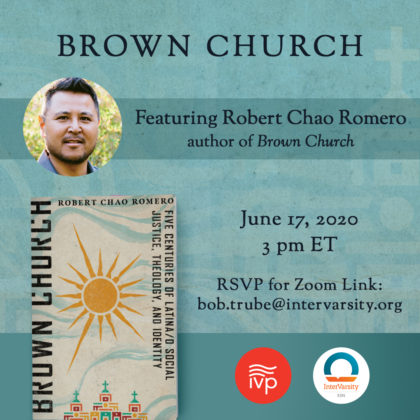
In the present moment, it seems like the most useful thing I can do is help make sure that other voices are heard, those with more personal stake in the matters of justice we are confronting. First, I apologize for not mentioning this last week, but Emerging Scholars Network is hosting a conversation with Robert Chao Romero, author of Brown Church, at 3pm EDT today (6/17/20). You’ll need to RSVP with Bob Trube to get the Zoom link (see the image for his e-mail). If there is a recording available after the fact, I’ll share it in a future post and update this one.
On more scientific topics, I’d recommend this conversation with public health expert Camara Phyllis Jones on the role of race, or more precisely racism, in the current coronavirus pandemic. As we have discussed in the past, skin color alone does not tell you everything else about someone’s biology. Thus the higher rates of COVID-19 infection and mortality among people of color likely have more to do with external circumstances than genetics. That’s not to say we should be indifferent to those who are at higher risk because of genetics, which are also relevant. But public health interventions to help people of color will need to address those external circumstances to be effective.
And if you didn’t have a chance earlier, check out this essay by Joseph Graves, Jr. on the relevance of representation in the sciences. His area is evolutionary biology, but what he has to say can be relevant to many fields. And in light of last week’s ShutDownSTEM conversations, I think his perspective is worth highlighting again.
You may also wish to make the time for the following conversations. First up, philosopher of biology Quayshawn Spencer on the reality of race. The discussion gets abstract and technical at times, but there is real complexity to race that is worth digging into with Spencer.
(If you prefer the written word and have appropriate journal access, you can check out a pair of papers by Spencer on racial realism.)
Earlier this week, BioLogos hosted a conversation on including black voices in the science & faith conversation. This is a more practical discussion of the needs of various communities–neighborhoods, churches, academics–and some ways to address those needs.
And one last time, a conversation with geneticist Adam Rutherford on his book How to Argue with a Racist. This conversation covers some of the same ground as the one with Spencer; at the same time, Rutherford is from the UK and has some different perspectives. He and Spencer also both provide some history of their respective universities and the roles of specific scientists in developing our understanding of race, for good and ill.
Andy has worn many hats in his life. He knows this is a dreadfully clichéd notion, but since it is also literally true he uses it anyway. Among his current metaphorical hats: husband of one wife, father of two teenagers, reader of science fiction and science fact, enthusiast of contemporary symphonic music, and chief science officer. Previous metaphorical hats include: comp bio postdoc, molecular biology grad student, InterVarsity chapter president (that one came with a literal hat), music store clerk, house painter, and mosquito trapper. Among his more unique literal hats: British bobby, captain’s hats (of varying levels of authenticity) of several specific vessels, a deerstalker from 221B Baker St, and a railroad engineer’s cap. His monthly Science in Review is drawn from his weekly Science Corner posts — Wednesdays, 8am (Eastern) on the Emerging Scholars Network Blog. His book Faith across the Multiverse is available from Hendrickson.

Leave a Reply